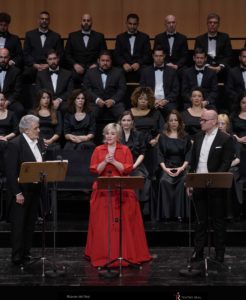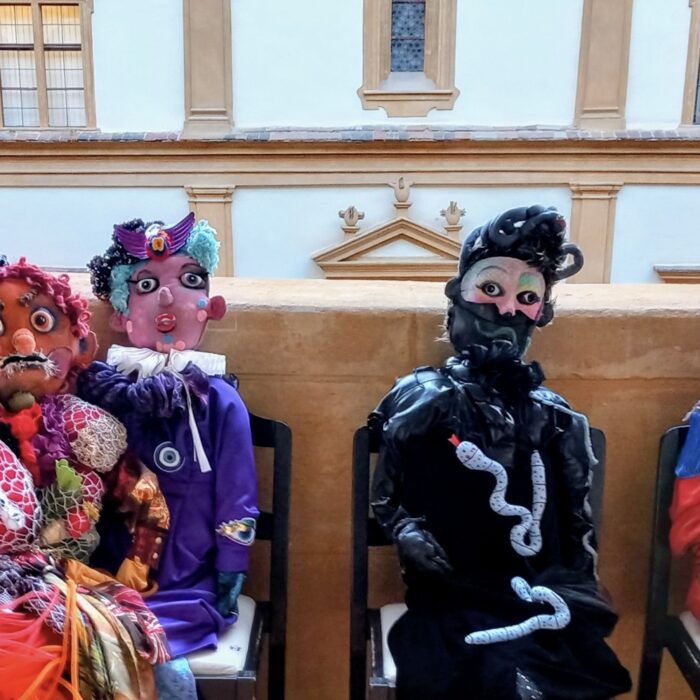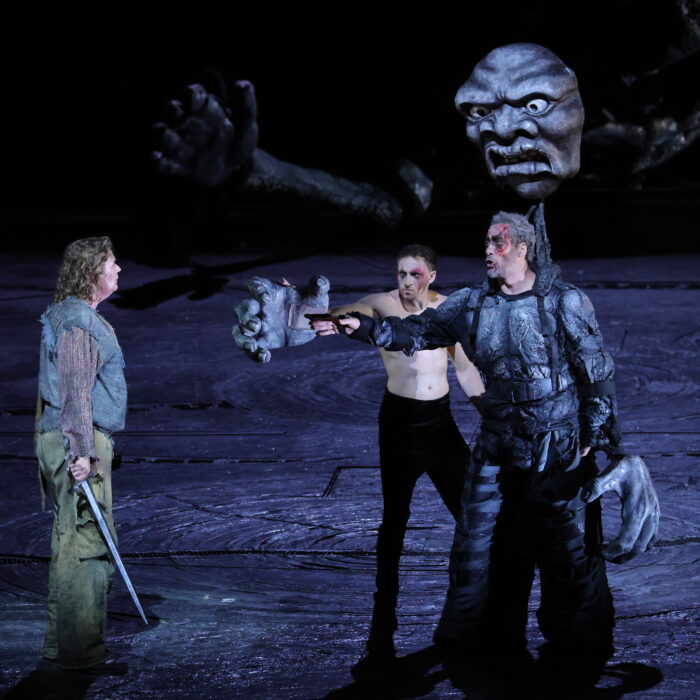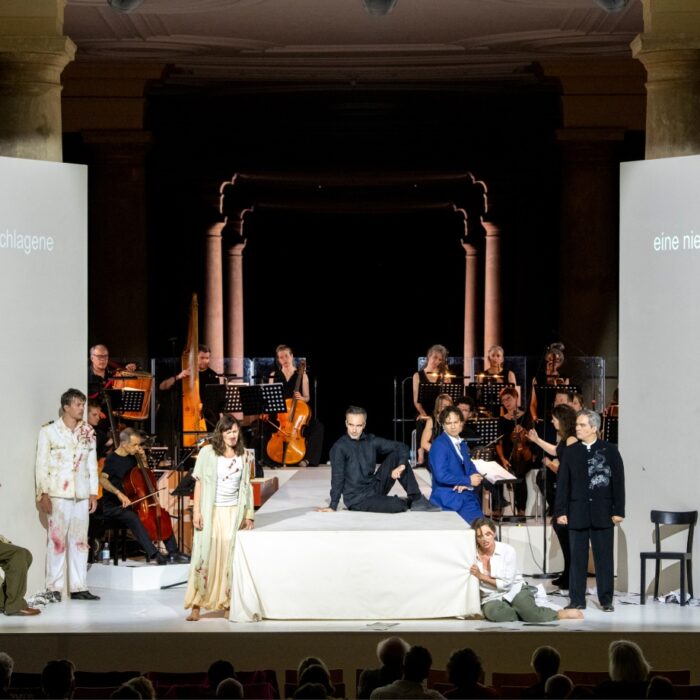
Teatro Real de Madrid 2018-19 Review: Giovanna D’Arco
Plácido Domingo Puts On A Wondrous Performance Of Rare Verdi opera
By Mauricio VillaThe Teatro Real closed its season with a lot of Verdi – 14 performances of “Il Trovatore” and three concert-version performances of “Giovanna d’Arco.”
It has been largely argued whether opera is to be only performed with staging or not. I mostly agree that Opera is a theatrical composition, and therefore should always be staged, but this concert performances usually give you the chance to hear unknown or rare compositions that are not usually staged nowadays or gather a cast of singers that can fit 10 days of rehearsals and performances into their schedule but who would not be able to compromise for a whole stage production. In this case, we have both: a rarely performed early opera and the presence of the incombustible Plácido Domingo.
It is not surprising that “Giovanna d’Arco” is not presented as a part of the main opera repertoire. It lacks the spontaneity and brightness of previous works like “Nabucco” or “Ernani,” and it relies mostly on bombastic heroic melodies for effect. Being confined by the rigid structure of the times with the recitativo, aria and cabaletta, Verdi does not manage to balance all his military marching style with the few andante-legato moments that the story provides. It is an interesting work if you want to analyze Verdi’s development from his early to mature operas, but it is not as dramatic or inspired as some of his other early compositions.
A Living Legend
Plácido Domingo is a living opera legend, and at the age of 78 years he can still step onto the stage and hypnotize the audience. It is incredible to witness the energy and projection that this extraordinary artist possesses. But the real miracle of Domingo is the sound of his voice as his timbre is practically the same with no alteration in the vibrato or wobble. Though it may possess a darker sound, his voice still sounds young; this defies all judgments if we consider the vast repertoire that he has sung and the crazy schedule that he has had all of his life.
While we are constantly seeing how young opera stars ruin their careers and witness the decline of their voices, Domingo continues to go onstage, opens his mouth, and defies nature with a career that continues to fascinate after 50 years.
There is the eternal discussion and criticism regarding his choice of moving to baritone roles in later years as he can no longer sustain a tenor tessitura and high notes. In my opinion, Domingo has always been a baritone singing tenor roles, which was exemplified with the difficulty he often had throughout his career with high notes and high tessitura. It was only naturally that he would eventually go back to the true nature of his voice. It is true that he lacks some air support in some phrases, but he showed, during this performance, how to sustain the long legato Verdi phrases in his aria “Speme al Vecchio era una figlia” in Act two, and his splendid duet with Giovanna, “Ecco!…ardite ed ululando” in Act three. He also showed his masterful, deep characterization of the role and coloring of the phrases in the passage “La bestemmia, oh, sperda, Iddio!…M’odi, oh re!” which turned out to be menacing and startling.
His voice can be perfectly heard in the midst of the ensemble when his colleagues and the chorus are singing and the orchestra is playing with intensity, which proves once more that his “choice” to move to baritone roles is appropriate.
Domingo is a theatrical animal, and thanks to the placing of the orchestra on the pit ( it is usually placed on stage in concert performances ) and the absence of chairs on the stage for the soloists, he could move freely about, always in character, singing lines hidden in the wings rather than being stuck in front of the music stand with his eyes fixed on the score, as his colleagues did.
Madrid’s audience loves Domingo and gave him a lengthy ovation after the performance.
Not A True Heroine
In the title role was soprano Carmen Giannattasio. She possesses a powerful lyrical instrument with an impersonal timbre and amazing looks that she knew how to put on display with the three gorgeous dresses and sparkling jewelry she wore throughout the night. However, she does not have the instrument nor the technique to confront such a devilish score.
Just as early tenor and baritone Verdi roles are usually affordable, the early soprano Verdi roles are extremely demanding. In the case of the role of Giovanna, which was written for the soprano Erminia Frezzolini, the tessitura lies mainly in the middle of the voice but with constant accessions to the upper register, at least around B natural in every intervention of the soprano but with several high C’s and a high D. It lacks the crazy coloratura present in “Nabucco,” “I Lombardi” or “Ernani,” but it has several passages with flourishes, especially when going to the higher notes.
Giannattasio sung a timid cavatina “Oh, ben s’addice… sempre all’alba ed alla sera,” avoiding the high D and singing the oppure line instead but with secure high B naturals and fluid vocal line. Then her ascension to the several high C’s in her following duet with tenor Michael Fabiano started to sound strident and uneasy, as both Giannattasio and the tenor sang with their eyes glued to the score. Once again she avoided a high C in pianissimi which is written at the end of the terzeto and chose the oppure version; it is a wise decision as she proved to be uncomfortable in the upper range of the voice and she can not produce pianissimi. She tried several diminuendi throughout the performance but her voice only stays in mezzo forte, never reaching this soaring and crystalline quality that pianissimi has.
She seemed more comfortable In her romanza in Act one “Oh, fatidica foresta” where she displayed long beautiful legato lines always sung in the middle register, but her attempt to do the crescendo/diminuendo on the last A flat resulted in dubious intonation due to a lack of support.
It did not get any better in the following acts. Her voice started to show signs of strain and tiredness, and her high notes sounded strident with unusual loudness. Sometimes her voice disappeared completely in ensembles. She tried to do her best in her final scene, but she didn’t connect with the audience as her face was constantly buried in the score. It is true that it was not a theatrical performance, but it was not a recording either. The artist was there on the stage facing the audience and it seemed reasonable to hope for the lead singer to make more attempts at connecting with the public.
10th Verdi Role
American tenor Michael Fabiano added the tenth Verdi role to his repertoire by singing Carlo.
He has one of the most beautiful and natural sounds in the opera world nowadays, his voice is potent throughout his whole register and he displays a perfect Verdi style in his long andante and sustained arias, as well as vibrant ardency in the cabalettas.
Early Verdi roles suit Fabiano’s voice perfectly as the tessitura lies in the middle of the voice which is the strongest part of his voice, with rare ascensions to high notes. In this case there is only a single B flat written in oppure, and Fabiano sang the score as written, with no interpolations or extra high notes.
There can be no doubt that he sang incredibly well, though there is something which worries me about Fabiano’s voice: it comes down to how he confronts his tessitura from G to his higher register; somehow the sound is too open on the high A and B, and there is a lot of tension in his whole body when producing these tones. A lot has been made of this aspect of his voice and time will tell how his voice develops. That said, Fabiano has been singing like this for quite some time and continues to produce impeccable performances time and again.
Ultimately, his interpretation of Carlo was impeccable though lacking passion, which was amplified by the fact that, like Giannattasio, his eyes were fixed on the score for most of the performance, diminishing his connection with the audience.
The veteran American conductor James Colon was in charge of the orchestra. He has already conducted three other Verdi operas in concert at Teatro Real ( “I vespri Siciliani” in 2014, “Luisa Miller” in 2016, and “Macbeth” in 2017) so he is no stranger to this orchestra and chorus.
His interpretation was mostly ostentatious, emphasizing the strong martial character of the music. There were some minor imbalances with the band and instruments playing off-stage, but we can guess this is due to the tight schedule of rehearsals that concert productions endure. He gave a strict reading of the score with no extra high notes or cadenzas added and respecting all the repetitions of the cabalettas and strettas.
The participation of the chorus was excellent and the ensemble was quite present in this opera.
In sum, this was a wondrous performance to witness if only for Domingo’s continued excellence at this stage in his career. Fabiano is always a pleasure to watch and even if Giannatassio was not quite right for the role, there is no doubt she gave her best.


